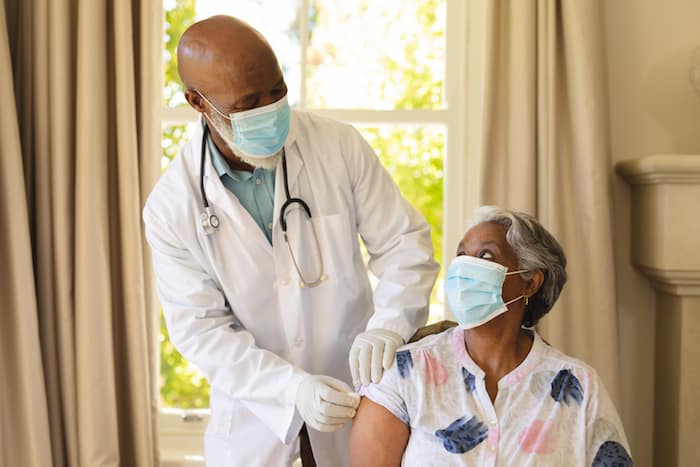Across the world, researchers continue to work to find new approaches and treatments to alleviate both the threat and impact of Alzheimer’s disease and other dementias on patients and their loved ones. While the aging of the global population is a known trend that has been fueling urgency around this for some time, a new, unexpected factor emerged in recent years that is driving even greater urgency: the link between COVID-19 and Alzheimer’s. The connection and commonalities between this virus and Alzheimer’s disease shine an even bigger spotlight on the importance of both expanding early detection of Alzheimer’s and of finding new ways to mitigate its impact on people’s lives.
Professor Mark Gluck, PhD, Professor of Neuroscience and Public Health, and Director of the Aging & Brain Health Alliance at Rutgers University, is working with his colleague at Rutgers Immunology, Patricia Fitzgerald-Bocarsly, PhD, to explore the link between COVID-19 and Alzheimer’s further. Their work focuses on populations that have historically experienced a disproportionate impact from both these health threats. Discussing their new study announced last year, Dr. Gluck explains, “we know that the risk factors for COVID-19 mortality and severity are almost identical to those for getting Alzheimer’s disease: obesity, hypertension, diabetes, and advanced age increase risk for both. This is of particular concern in African American communities where these health issues are all common. As a result, African Americans suffered greatly from COVID-19 and continue to suffer at two to three times the rate of the rest of the population with Alzheimer’s disease.”
In their study, Dr. Gluck and his collaborators are focused on answering questions like: “If someone develops COVID-19, can this increase their risk for later getting Alzheimer’s disease? If so, who will be most at risk and what are the biological pathways from COVID-19 infection and response to increased Alzheimer’s risk?” They expect to have initial cross-sectional results within a year to see if participants who had COVID-19 show higher rates of cognitive, neural, or pathological measures of Alzheimer’s risk compared to those who did not get the virus. However, it will be several years before the team will be able to see if the two groups differ in terms of Alzheimer’s prevalence, as participants are all cognitively healthy when first enrolled in the study.
Digital technology is playing a significant role in the study team’s work, facilitating objective, sensitive, and convenient data collection. They are using digital solutions to gain objective insight into key indicators and track participant results over time – including data collected remotely while patients are at home. These solutions include “mobile EEG-based sleep monitors linked via the cloud to the research lab to monitor participant’s brain waves during sleep overnight in their homes,” as well as Linus Health’s iPad-based digital cognitive assessments “to quickly get an objective snapshot of cognitive functions that may have been disrupted by COVID-19.”
Delivering objective, sensitive insights about a person’s cognitive status is a key benefit that digital, AI-enhanced cognitive assessments offer to both researchers and clinicians. Asked about their role in the study and more broadly, Dr. Gluck emphasizes the importance of uncovering subtle signs and changes over time: “it’s important to distinguish between ‘Long COVID,’ which refers to lingering and persistent symptoms of brain fog, attentional impairments, and other sensory and motor dysfunctions that stay on for weeks or months from initial infection (and are probably not related to Alzheimer’s), and the subtle changes in brain systems or immune function that may not show apparent symptoms now, but could increase later risk for Alzheimer’s as a silent brain problem.” Given the complexity of the brain and the many factors that can influence one’s cognitive trajectory, the ability to assess subtle signs and changes is essential for advancing both brain care and research – something AI is helping make more feasible.
Adding COVID-19 to the list of threats to cognitive health is concerning to say the least. However, the more we can understand about what affects cognitive functioning, the better the interventions that can be designed and the more we can empower people to take action early to promote cognitive health whenever possible. This is one of many reasons studies like the one Dr. Gluck and his collaborators are conducting are so important. Whether it’s diet, health conditions, blood pressure, genetics, COVID-19, or some combination of factors heightening individual risk for cognitive disorders, one imperative holds true: the need to detect signs of decline as early as possible. This affords people the largest window of opportunity to pursue interventions and plan for the future. Furthermore, routine screening establishes a baseline and longitudinal profile, which is key to optimizing personal, lifelong brain health and quickly flagging anything amiss. Making this possible will require a more proactive, widespread approach to cognitive screening and COVID-19’s potential impact is yet another compelling reason why the time is now to make that shift.

David Bates, PhD
David Bates, PhD is the CEO and co-founder of Linus Health, a Boston-based digital health company focused on transforming brain health for people across the world. He is a scientist, engineer, inventor, entrepreneur, and investor. David was a founding partner of Tamarisc Ventures and co-founded Bode, a tech-enabled hospitality company for group travel. He is on the board of several technology companies, as well as the philanthropic TMCity Foundation. David has previously held positions at Morningside Ventures, F-Wave, Harvard Medical School, Massachusetts General Hospital, University of Louisville, and Georgia Tech. He earned his PhD in Chemical and Materials Engineering from the University of Auckland and his BS and MSc in Applied Biology from the Georgia Institute of Technology.








